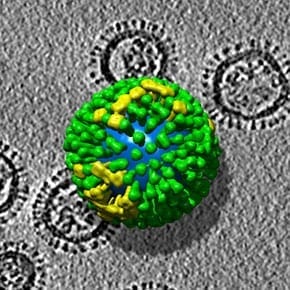Flu epidemics cause up to half a million deaths worldwide each year, and emerging strains continually threaten to spread to humans and cause even deadlier pandemics. A study recently published in the journal Immunity reveals that a drug that inhibits a molecule called prostaglandin E2 (PGE2) increases survival rates in mice infected with a lethal dose of the H1N1 flu virus. The findings pave the way for an urgently needed therapy that is highly effective against the flu virus and potentially other viral infections.
“Drugs that specifically target PGE2 pathways have already been developed and tested in animals, so our results have excellent potential for clinical translation, not only for the treatment of influenza, but also other viral respiratory infections that interact with similar host immune pathways,” says senior study author Maziar Divangahi of McGill University.
COX Inhibitors and Influenza
Despite the worldwide use of vaccination and other antiviral interventions, the flu virus remains a persistent threat to human health. To investigate molecular pathways that could be targeted by novel interventions, Divangahi and his team became interested in ibuprofen, which is commonly used to manage flu-like symptoms. By inhibiting a molecule called cyclooxygenase (COX), ibuprofen and other nonsteroidal anti-inflammatory drugs (NSAIDs) lower the production of prostaglandins—immune molecules that contribute to pain and fever. But COX inhibition has produced conflicting effects on immune responses and survival rates in animals infected with the flu virus, highlighting the importance of clarifying the role of prostaglandins in antiviral immunity.
Focusing on PGE2
In the new study, Divangahi and his team found that mice genetically engineered to lack PGE2 showed enhanced immune responses, lower viral levels in the lungs, and better survival rates following infection with a lethal dose of the H1N1 flu virus compared with infected mice that were not genetically modified. Similarly, mice treated with a compound that inhibits PGE2 showed enhanced antiviral immunity and survival rates following infection with a lethal dose of the flu virus compared with untreated mice.
“We believe that previous studies produced conflicting results because COX inhibition affects all prostaglandins, not just PGE2,” Divangahi says. “Our findings suggest that different prostaglandins have different roles in antiviral immunity and that specific inhibition of PGE2 will be much more effective than NSAIDs at protecting against influenza infection.”
Source: Cell Press.


